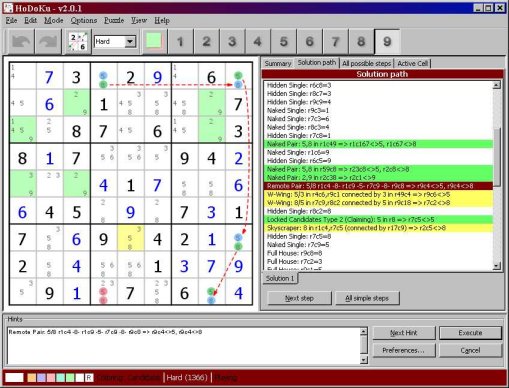|
|
HoDoKu (Bernhard Hobiger)
by Jocelyn Doire
Sudoku is a
game that plays on a 9-by-9 grid that requires putting
the digits from 1 to 9 in every row, in every column and
in every sub 3-by-3 grid. The rules are pretty simple but
trying to solve some of those little puzzles can get
terribly hard, making the game a good exercise for your
mind, and a good way to pass some time with an
interesting game.
The easy levels can be solved all in your mind, but for
the harder levels it becomes necessary to write down all
the "candidates" that a cell can have in order
to solve the puzzle, and anyone who has tried to use a
pen and paper knows that it gets pretty tedious to keep
track of all of them. Lots of programs exist to play
Sudoku, but one that I find particularly good is called
HoDoKu, a free and GPL program written in Java that is
available on SourceForge at
http://sourceforge.net/projects/hodoku/.
HoDoKu lets you play the game like you do on paper,
select the level you wish and click on the “create a
puzzle” button (with the 2/6 in a grid) to create a
sudoku grid that is guaranteed to have a unique solvable
game. If desired, you have the option to have all the
candidates shown in light grey in every cell, which are
updated immediately whenever you add a new valid digit
(in blue).

If you get stuck you can ask the
program to give you a "vague hint" (Puzzle >
Vague Hints…) to help you move forward without
revealing everything, or click on the "Next
Hint" button to show you the next possible step,
with a full explanation and with all the relevant
candidates highlighted.
You can click on any of the digit filters, at the top, to
highlight all the cells with that digit in green, helping
you in your search for candidates that can be eliminated.
Where the program really shines is that HoDoKu can be
your teacher. For example, you can view the complete path
to a solution for any given puzzle, and by double
clicking on any of the steps, HoDoKu fills the grid with
all the previous steps, highlights all the relevant
candidates, all colour coded, and even adds arrows for
very complicated techniques.

If that is
not enough for you, you can even ask HoDoKu to calculate
every single possible step to solve a grid from any
configuration and to sort them all in 5 different ways,
letting you study in depth the various ways a game can be
solved. If you are interested in a particular technique
you can select it using the configuration menu and then
search for its every occurrence.
If desired, you can work on specific techniques by
selecting Mode > Practising… and then select all
those that you want, and when you create your next game
it will include those techniques (note that it can take a
while to create a game depending on the selections).

Further help is also available on
the HoDoKu web site with a complete manual that explains
all the features of the program in detail. The site also
has an extensive list of all the techniques that HoDoKu
is able to use, and believe me, that list is a lot more
extensive than I could ever imagine was possible.
http://hodoku.sourceforge.net/en/techniques.php.
Other sites exist also on the web, but one I find
particularly interesting is an equivalent to Wikipedia
but dedicated only to the game:
http://sudopedia.org.
If you are looking for a guide
on how to help solve Sudoku games you can check
http://www.angusj.com/sudoku/hints.php
from the author of another
program called "Simple Sudoku".
If you want to study a particular game, you can enter it
manually or use the clipboard, select the analyser mode
to view all the steps that are needed to solve it, move
them around, and play different "what if"
scenarios. You can ask the program to execute the all
simple moves so that you can concentrate on the harder
ones, for example.
The only complaint I have about HoDoKu, and it's a minor
one, is that it's a very serious program, maybe a bit too
much. For example, when you complete a game there are no
fireworks, no sounds, no message, just the grid with all
the digits and no indication that you’ve won.
There is a lot more in that program than I can cover in
this article, but let’s just say that if you do take
the time to explore everything that HoDoKu has to offer
then you are going to become a much better Sudoku player.
Enjoy!
Bottom Line:
HoDoKu (Freeware)
Bernhard Hobiger
http://sourceforge.net/projects/hodoku/
Originally published: June, 2011
top of page
|
Archived Reviews
A-J
K-Q
R-Z
The opinions expressed in these reviews
do not necessarily represent the views of the
Ottawa PC Users' Group or its members.
|